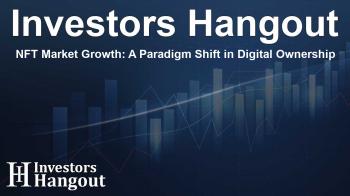NFT Market Growth: A Paradigm Shift in Digital Ownership

Innovations in the Non-Fungible Token Market
The global NFT market is witnessing a transformative phase, expected to expand substantially by USD 84.13 billion between 2025 and 2029. This growth is primarily driven by the rising demand for digital art and the increasing role of artificial intelligence in shaping market trends. Businesses are eager to tap into this burgeoning market as digital assets redefine ownership in modern society.
The Surge of Digital Art
In recent years, digital art has flourished like never before, thanks in large part to NFTs, which offer artists a platform to present and monetize their creations uniquely. Artists are no longer confined to traditional galleries; instead, they can showcase work on blockchain-powered platforms, reaching a global audience. This evolution fosters creativity and provides financial opportunities for artists, reinforcing the NFT ecosystem's vitality.
Market Growth Projections
As the NFT market gears up for explosive growth, it is projected to maintain a compound annual growth rate (CAGR) of 30.3% during the forecast period. With numerous sectors raging from art to gaming embracing this innovative technology, the diversity of use cases continues to expand. Major brands are increasingly interested in leveraging NFTs to enhance consumer engagement and loyalty.
Adoption by Big Brands
Renowned brands are diving headfirst into the NFT space, seeking novel ways to engage customers through unique digital assets. For instance, brands like Visa and Budweiser are exploring NFTs as rewarding digital collectibles for consumers. The buzz around Web 3.0 facilitates these initiatives, further driving the adoption curve in the e-commerce sector.
Challenges in the NFT Ecosystem
Despite the excitement surrounding NFTs, considerable challenges linger in the ecosystem. Issues such as uncertainty in regulatory frameworks and concerns over fraud pose hurdles for both buyers and sellers in this landscape. As the technology evolves, so too must the legal and regulatory frameworks surrounding it to ensure a fair marketplace and protect consumers.
Regulatory Considerations
The NFT community is actively calling for clear regulations that balance innovation with consumer rights. Intellectual property, taxation, and consumer protection are critical areas that need careful attention as the ecosystem scales. Addressing these questions will determine the sustainability and widespread acceptance of NFTs.
The Future of NFTs
The future for NFTs is promising, with substantial room for growth and innovation. The potential for tokenizing virtually any asset—from physical properties to intellectual assets—opens up myriad possibilities for commercialization. As technology advances, integrating augmented reality (AR) and virtual reality (VR) will likely further enhance NFT experiences, providing users with immersive ways to interact with their digital assets.
Decentralized Finance and NFTs
As the NFT landscape matures, it intersects increasingly with decentralized finance (DeFi), presenting new opportunities for creators. This synthesis allows artists to monetize their work through emerging platforms by offering creative financial frameworks that were previously unavailable. The marriage of DeFi and NFTs creates an exciting narrative for the financial future.
Investing in the NFT Space
For investors, the NFT space offers unique opportunities, although it does require a keen understanding of market dynamics. The unpredictable nature of demand and valuation means participants must remain vigilant and informed. Exploring new trends and staying updated on market shifts could lead to fruitful investment avenues in this emergent field.
Conclusion
The non-fungible token market is poised for significant evolution, driven by innovative digital ownership and transformative technology. As brands integrate NFTs into their business models, the landscape will likely continue to expand, offering new insights into the future of commerce, creativity, and economic structures.
Frequently Asked Questions
What is the current market trend for NFTs?
The NFT market is experiencing significant growth, driven by the rising popularity of digital art and brands adopting this technology for consumer engagement.
How fast is the NFT market growing?
The NFT market is projected to grow by USD 84.13 billion from 2025-2029, with a CAGR of 30.3% during this period.
What challenges do NFTs face?
Challenges include regulatory uncertainties, risks of fraud, and the need for a clearer legal framework regarding consumer protection and intellectual property rights.
How are brands using NFTs?
Brands are exploring NFTs as digital collectibles to enhance customer interactions, offering unique rewards and creating exclusive content for consumers.
What does the future hold for NFTs?
The future appears bright, with anticipated integration of NFTs in DeFi, continuous innovation in digital ownership, and expansion across various sectors.
About The Author
Contact Lucas Young privately here. Or send an email with ATTN: Lucas Young as the subject to contact@investorshangout.com.
About Investors Hangout
Investors Hangout is a leading online stock forum for financial discussion and learning, offering a wide range of free tools and resources. It draws in traders of all levels, who exchange market knowledge, investigate trading tactics, and keep an eye on industry developments in real time. Featuring financial articles, stock message boards, quotes, charts, company profiles, and live news updates. Through cooperative learning and a wealth of informational resources, it helps users from novices creating their first portfolios to experts honing their techniques. Join Investors Hangout today: https://investorshangout.com/
The content of this article is based on factual, publicly available information and does not represent legal, financial, or investment advice. Investors Hangout does not offer financial advice, and the author is not a licensed financial advisor. Consult a qualified advisor before making any financial or investment decisions based on this article. This article should not be considered advice to purchase, sell, or hold any securities or other investments. If any of the material provided here is inaccurate, please contact us for corrections.

